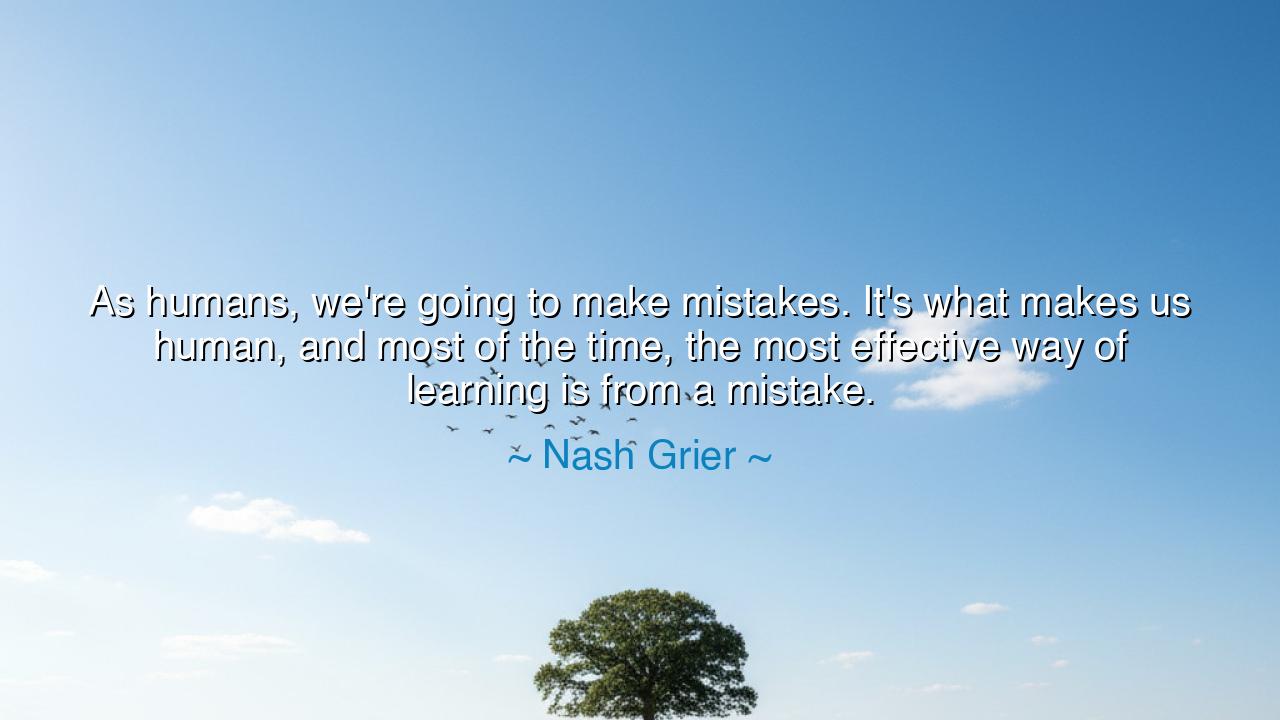
As humans, we're going to make mistakes. It's what makes us
As humans, we're going to make mistakes. It's what makes us human, and most of the time, the most effective way of learning is from a mistake.






“As humans, we’re going to make mistakes. It’s what makes us human, and most of the time, the most effective way of learning is from a mistake.” Thus spoke Nash Grier, voicing a truth as ancient as the dawn of thought. His words are simple, yet they shine with a wisdom that binds all generations—that to err is the essence of being human, and that from error springs not shame, but understanding. For the human soul was never made flawless; it was made to strive, to fall, to rise again, and through that struggle, to draw nearer to wisdom.
Since the beginning of time, mankind has wrestled with imperfection. The first tools were rough, the first fires uneven, the first words uncertain. Yet from each misstep, humanity learned a little more of its own power. The mistake became the forge of progress. In every art, every science, every act of love, failure has been the unseen teacher. What Grier speaks, therefore, is not a modern thought, but a timeless law: that error is not the end of the road—it is the first stone upon the path of truth.
Consider the tale of Christopher Columbus, who sought a western road to Asia and found instead an unimagined world. His maps were flawed, his assumptions mistaken, yet his voyage altered the shape of history. Though his journey was born from error, it revealed new continents and set in motion the mingling of civilizations. Thus, what was once a mistake became a moment of transformation. So it is with all great endeavors—when guided by courage and reflection, failure becomes discovery, and imperfection becomes creation.
The ancients understood this truth well. The philosopher Aristotle taught that we learn virtue not by knowing what is right, but by doing, by practicing, by failing and adjusting until the act of good becomes the habit of the soul. The sculptor’s first chisel stroke may mar the stone, but in that imperfection, he perceives the form hidden within. So too does every human being sculpt their character through their errors. We err, we reflect, we refine—and in that cycle, we grow closer to the ideal of who we were meant to be.
Yet in the world of men, many fear failure. They mistake it for weakness, when in truth it is the sign of a living, striving spirit. Only the one who dares risks error, and only the one who risks error may know growth. The stagnant heart, afraid to act for fear of imperfection, learns nothing and becomes nothing. It is the fallible who learn, and the learner who evolves. As Grier reminds us, it is in our mistakes that we meet our humanity—not the polished illusion of perfection, but the honest, beating truth of effort and resilience.
We must, then, learn to look upon our failures not with despair, but with curiosity. Each error is a mirror that reflects a hidden truth: something we did not yet understand, something we have now been given the chance to master. The wise do not flee from their faults—they listen to them. They ask, “What have you come to teach me?” and in doing so, they turn defeat into power. In this way, mistakes cease to be wounds and become instead teachers—harsh at times, but always faithful.
Let the example of Thomas Edison remind us of this eternal principle. When he was asked how he endured a thousand failed experiments before creating the light bulb, he answered, “I did not fail a thousand times. I learned a thousand ways how not to make a light bulb.” That is the spirit of Grier’s truth. Every failure is a step forward, every mistake a map of where not to tread, guiding us ever closer to the path that leads to success.
So, O listener of the modern age, take this teaching to heart: embrace your mistakes as sacred companions on the road to wisdom. Do not hide from them or curse them, but study them as one would study the stars to find one’s way home. When you fall, rise with understanding. When you fail, fail bravely and learn fully. For perfection is not the absence of error—it is the courage to learn from it. And thus, through every mistake, every trial, every stumble, you become more deeply human, and in that humanity, more divine.






AAdministratorAdministrator
Welcome, honored guests. Please leave a comment, we will respond soon